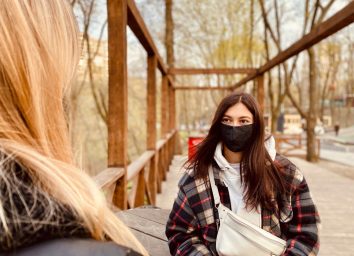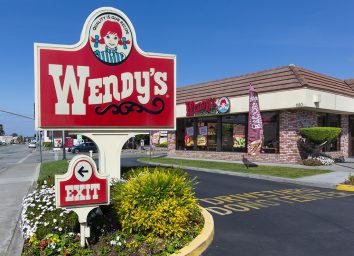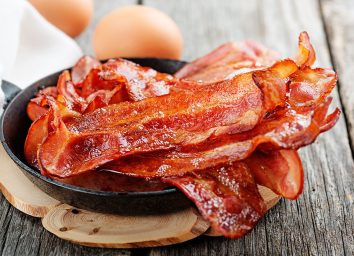Expect to Use This Tech at Restaurants Near You Soon

More restaurants are beginning to widely embrace QR code technology in a number of new and clever ways. The smartphone-enabled technology has been in existence for decades, but as the foodservice industry bounces back from the coronavirus lockdown, expect to see more usage of QR code scans when you go out to eat.
"QR" is abbreviated from "quick response," and is the trademark for a type of matrix barcode that first came out in Japan in 1994. It is a machine-readable black and white square that resembles a two-dimensional barcode and, when scanned by one's smartphone, can immediately exchange information between the user and a business. Many national chains already employ QR codes as a marketing tool for customer loyalty programs. But the very same technology can also be used to seamlessly download a restaurant's menu right to your phone, which limits the sharing of paper menus and person-to-person contact. (Related: 5 Major Changes You'll See to Restaurant Menus in the Future.)
The way it works is quite simple: As you're seated at a table, you'll be encouraged to scan a QR code that's displayed on the table, which allows for easy access to an online menu as well as the option to order food online if a restaurant so chooses.
For many restaurant owners, the potential uses of the QR code go well beyond just customer and worker safety. In an interview with NBC Montana, Arkinda Mickelson of Bozeman's Club Tavern and Grill noted how going digital has been saving her from having to print menus. "In one week alone, between breakfast, lunch, dinner, and our drink menus, we went through about 1,500 sheets of paper, and that's not including the ink," the food and beverage manager said. "So we're looking at (saving) over $1,000 in a week."
However, there is also the possibility that QR codes will be used to collect data from restaurant customers and engage in contract-tracing.
Restaurants in South Korea, for instance, are testing the use of QR codes to track people with current coronavirus cases and prevent them from spreading it to others. The New York Times recently reported that South Korea's decision "to mandate QR codes to register visitors' identities came after authorities struggled to trace people who had visited a number of nightclubs and bars at the center of a virus outbreak last month after much of the information on handwritten visitor logs was found to be false or incomplete."
The tracing of coronavirus cases enabled by QR codes may be an inventive pursuit of protecting public health, but it also raises tough questions about digital privacy. Nonetheless, as restaurants reopen here in the U.S. and test new ways to make patrons and staffers feel safe, expect to see more QR codes and virtual-only menus popping up all over the place. For more, check out these changes you'll see at restaurants in the days and weeks ahead. And, sign up for our newsletter to get the latest restaurant news delivered straight to your inbox.








